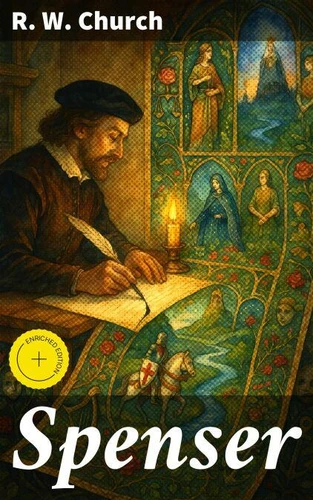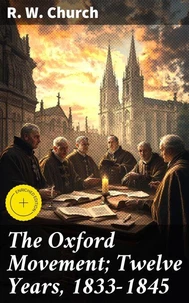Spenser. Enriched edition. Uncovering the Allegorical Tapestry of Spenser's Poetic World
Par : ,Formats :
Disponible dans votre compte client Decitre ou Furet du Nord dès validation de votre commande. Le format ePub est :
- Compatible avec une lecture sur My Vivlio (smartphone, tablette, ordinateur)
- Compatible avec une lecture sur liseuses Vivlio
- Pour les liseuses autres que Vivlio, vous devez utiliser le logiciel Adobe Digital Edition. Non compatible avec la lecture sur les liseuses Kindle, Remarkable et Sony
 , qui est-ce ?
, qui est-ce ?Notre partenaire de plateforme de lecture numérique où vous retrouverez l'ensemble de vos ebooks gratuitement
Pour en savoir plus sur nos ebooks, consultez notre aide en ligne ici
- Nombre de pages226
- FormatePub
- ISBN406-4-06-614486-9
- EAN4064066144869
- Date de parution20/12/2019
- Protection num.Digital Watermarking
- Taille1 Mo
- Infos supplémentairesepub
- ÉditeurGOOD PRESS
Résumé
In "Spenser, " R. W. Church offers a comprehensive examination of Edmund Spenser's life and works, focusing particularly on the intricate connections between his poetic form and the political landscapes of the late 16th century. Church's literary analysis is deft, employing a blend of historical context and textual criticism that illuminates Spenser's innovative use of the sonnet and allegory. The book engages with themes of nationhood, identity, and morality, situating Spenser within the contemporary debates of the Elizabethan era while also addressing the enduring questions that his poetry raises about nature and human experience.
R. W. Church, an esteemed literary scholar, draws upon extensive research and historical methodology to construct a narrative that not only reflects Spenser's idiosyncratic style but also delves into his motivations and influences as a poet. Church's academic background, steeped in Renaissance literature and critical theory, enables a nuanced perspective that resonates with both Spenser's contemporaries and the modern reader alike.
His rigorous scholarship is evident, offering a deeper understanding of Spenser's paradigm as a poet of his time. "Spenser" is an essential read for scholars and enthusiasts of Renaissance literature, illuminating not only Spenser's work but also the socio-political complexities of his time. Church's insightful commentary and robust analysis make this book an invaluable resource for anyone seeking to grasp the intricacies of Spenser's poetic genius and his enduring legacy in the canon of English literature. In this enriched edition, we have carefully created added value for your reading experience: - Hand-picked Memorable Quotes shine a spotlight on moments of literary brilliance. - Interactive footnotes clarify unusual references, historical allusions, and archaic phrases for an effortless, more informed read.
R. W. Church, an esteemed literary scholar, draws upon extensive research and historical methodology to construct a narrative that not only reflects Spenser's idiosyncratic style but also delves into his motivations and influences as a poet. Church's academic background, steeped in Renaissance literature and critical theory, enables a nuanced perspective that resonates with both Spenser's contemporaries and the modern reader alike.
His rigorous scholarship is evident, offering a deeper understanding of Spenser's paradigm as a poet of his time. "Spenser" is an essential read for scholars and enthusiasts of Renaissance literature, illuminating not only Spenser's work but also the socio-political complexities of his time. Church's insightful commentary and robust analysis make this book an invaluable resource for anyone seeking to grasp the intricacies of Spenser's poetic genius and his enduring legacy in the canon of English literature. In this enriched edition, we have carefully created added value for your reading experience: - Hand-picked Memorable Quotes shine a spotlight on moments of literary brilliance. - Interactive footnotes clarify unusual references, historical allusions, and archaic phrases for an effortless, more informed read.
In "Spenser, " R. W. Church offers a comprehensive examination of Edmund Spenser's life and works, focusing particularly on the intricate connections between his poetic form and the political landscapes of the late 16th century. Church's literary analysis is deft, employing a blend of historical context and textual criticism that illuminates Spenser's innovative use of the sonnet and allegory. The book engages with themes of nationhood, identity, and morality, situating Spenser within the contemporary debates of the Elizabethan era while also addressing the enduring questions that his poetry raises about nature and human experience.
R. W. Church, an esteemed literary scholar, draws upon extensive research and historical methodology to construct a narrative that not only reflects Spenser's idiosyncratic style but also delves into his motivations and influences as a poet. Church's academic background, steeped in Renaissance literature and critical theory, enables a nuanced perspective that resonates with both Spenser's contemporaries and the modern reader alike.
His rigorous scholarship is evident, offering a deeper understanding of Spenser's paradigm as a poet of his time. "Spenser" is an essential read for scholars and enthusiasts of Renaissance literature, illuminating not only Spenser's work but also the socio-political complexities of his time. Church's insightful commentary and robust analysis make this book an invaluable resource for anyone seeking to grasp the intricacies of Spenser's poetic genius and his enduring legacy in the canon of English literature. In this enriched edition, we have carefully created added value for your reading experience: - Hand-picked Memorable Quotes shine a spotlight on moments of literary brilliance. - Interactive footnotes clarify unusual references, historical allusions, and archaic phrases for an effortless, more informed read.
R. W. Church, an esteemed literary scholar, draws upon extensive research and historical methodology to construct a narrative that not only reflects Spenser's idiosyncratic style but also delves into his motivations and influences as a poet. Church's academic background, steeped in Renaissance literature and critical theory, enables a nuanced perspective that resonates with both Spenser's contemporaries and the modern reader alike.
His rigorous scholarship is evident, offering a deeper understanding of Spenser's paradigm as a poet of his time. "Spenser" is an essential read for scholars and enthusiasts of Renaissance literature, illuminating not only Spenser's work but also the socio-political complexities of his time. Church's insightful commentary and robust analysis make this book an invaluable resource for anyone seeking to grasp the intricacies of Spenser's poetic genius and his enduring legacy in the canon of English literature. In this enriched edition, we have carefully created added value for your reading experience: - Hand-picked Memorable Quotes shine a spotlight on moments of literary brilliance. - Interactive footnotes clarify unusual references, historical allusions, and archaic phrases for an effortless, more informed read.







